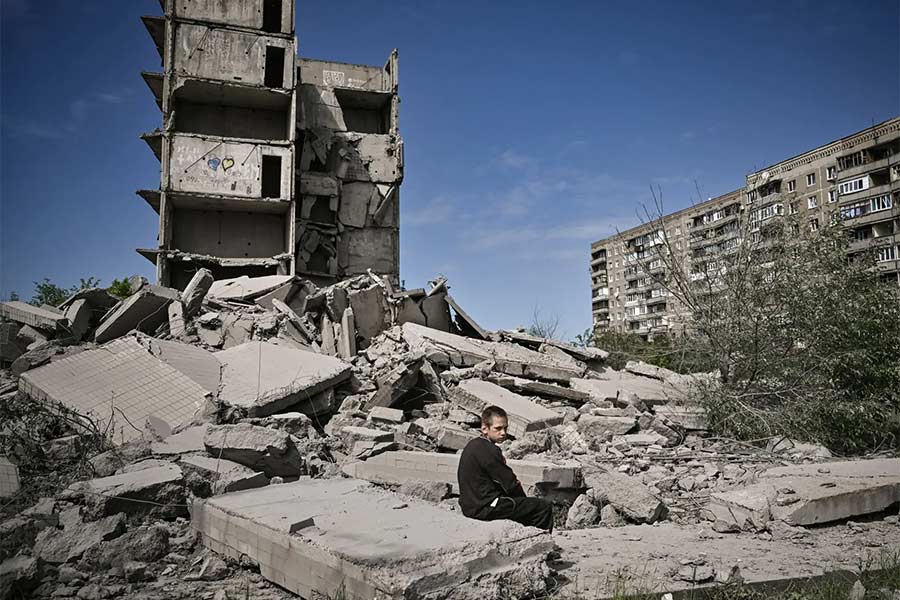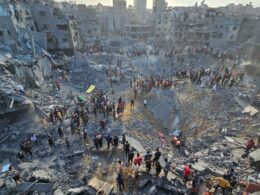By Walter Chambers, International Socialist Alternative
The immediate and horrific humanitarian costs of the war in Ukraine are measured in the number of fatalities and wounded caused by the fighting and continuous bomb attacks on Ukraine’s cities, as well as in the number of refugees from the war. For those who are already suffering directly, the consequences will be felt for years ahead.
At the same time, the war is having an almost incalculable effect on future lives through the humanitarian, social, and environmental damage it is wreaking. The most notable single event, apart obviously from the launch of the occupation itself, has been the breach of the Kakhovka dam in early June. Whether due to the intentional destruction of the dam [Ukrainian sources claim they overheard communications between Russian troops which suggested the breach was far more serious than intended] or because of the collapse of the dam due to previous bomb damage and the build-up of the spring flood waters, the catastrophe is a direct result of the Russian invasion.

It follows a long history of the destruction of dams by imperialist powers as part of their war efforts. The Belgian army in 1914 opened the canal locks at Nieuwpoort to stop the German advance, the Chinese Kuomintang blew up dams on the Yangtse river, in the process killing up to 500,000 peasants. The British RAF notoriously destroyed the Mohne dam in 1943 while the US destroyed dams during the North Korea and Vietnam wars. In an attempt to defeat ISIS, in 2017 US aircraft attacked the Tabqa Dam in Eastern Syria but fortunately did not succeed, as the flooding would have drowned hundreds of thousands.
Now we see the consequences of the destruction of the Kakhovka dam. Thousands have lost their homes, and many died. The release of millions of tons of water swept southwards, leading to the overflow of tributaries and the flooding of over 50 settlements, and for a while part of Kherson city. Upstream from the dam river levels fell leaving huge numbers of perished fish. This disruption also dislodged mines that had been laid, and stirred up all sorts of pollutants and toxic materials that have swept downstream, much of it ending up in the Black Sea. The safety of the Zaporizhzhia Nuclear Power Station (ZNPS), the largest in Europe, was put under threat as its reactors rely on a stable water supply for cooling.
Incredible damage has been done to bio-diversity. Forty protected areas have been impacted, including Europe’s largest desert, the 1600 square kilometer area of Oleshky sands. Dozens of red-book species are thought to have been wiped out.
Although the water is now receding, a simple clean-up will not be sufficient to repair the damage. Much of what has until recently been fertile agricultural land would in the past have been arid, almost desert land. Modern irrigation techniques helped but relied on water from the Kakhovka reservoir. Half a million hectares of cultivated land will now be without water for some years. This will further exacerbate the grain supply crisis, forcing up prices and leading to food shortages, and even famine, in parts of Asia and Africa.

The damage from the collapse of the dam will add to that already caused by the war. The destruction of whole cities, landscapes littered with destroyed equipment, and widespread minefields will take years to clean up. As industrial plants, chemical stores and fuel dumps have been attacked, the air and land will have been filled with pollutants. Military vehicles and aircraft are no friends of the environment either. Before the war, very conservative estimates suggest that global military activity accounts for 5.5% of greenhouse gas emissions. These are barely mentioned in COP plans. As global military expenditure increased by 3.7% in 2022 and is likely to grow even more in 2023 and onwards, that alone will increase emissions. At the same time, research in Ukraine itself estimated that the war had caused an extra 100 million tonnes of CO2 emissions in the first seven months alone. This is equivalent, for example, to the annual emissions of a country like Netherlands.
A significant part of these emissions arise from the fires caused by the incessant bombing campaigns of the military. But the wildfires sweeping Siberia are adding to the problem. Already by May, it appeared that the area of boreal forest burning in Russia’s far north was already a third of the whole area burnt in 2021 — then a record year. The burning of the boreal forests is a ‘time bomb of carbon’ according to a report in Scientific American. They release 10–20 times more carbon than fires in other eco-systems. In previous periods such wildfires accounted for 10% of wildfire emissions — by 2021 the proportion had reached 23%. If in previous years, the privatisation of forest management and emergency response services played a big role in the deterioration of these forests, the situation has been made worse because many forestry personnel have been mobilised to fight in Ukraine.
The spectre of the use of nuclear weapons has also been raised several times during the war. Even without their use, the dangers of nuclear explosions are inherent because the ZNPS is at the centre of fighting. Warmongers attempt to play down the consequences if any of the six reactors at ZNPS was to explode, they say the deaths resulting from the Chernobyl catastrophe were minimal. Yet scientific research reports that up to 200,000 died as a consequence of Chernobyl. But aside from that, western governments are beginning to supply uranian-tipped shells, the use of which during the gulf war created serious environmental problems.

The energy crisis caused by the war has forced a reversal of previous already unrealistic plans to deal with the global climate crisis. In Ukraine itself, the loss of energy from ZNPS, which supplied 25% of the country’s electricity will be replaced by coal-fired power stations. As countries, particularly in Europe, move to replace oil and gas previously purchased from Russia they are returning to harmful energy supplies. Germany is extending its coal-fired production, France is extending the life of its nuclear plants, while Britain is building new atomic power stations. Following a bitter showdown between German and French interests in the European Parliament, it now appears that the EU will allow more nuclear energy, and retreat from its proposed law to protect biodiversity.
All of these examples serve to demonstrate not just that this war must be stopped, with Russia forced to withdraw its troops and a massive reduction in all military expenditure, but when war is caused by the conflict between different national capitalist interests, the capitalists cannot even plan to repair the damage they have done.
The “Ukraine War Environmental Consequences Work Group” (UWEC), an alliance of environment NGOS, journalists, and experts sent an appeal to the “Ukraine Recovery Conference” which took place in London this week to warn that already international business interests are seeking “lucrative contracts” to rebuild the dam while ignoring any environmental or sustainability issues. Indeed, Volodymyr Zelensky in addressing the government officials and businessmen at the conference declared loudly that helping to rebuild Ukraine will create “profits for countries all over the world”. He and his government are rushing to ensure that all the conditions exist, with restrictions on workers’ rights and deregulation for business so that after Russian forces have destroyed the country, the 400 foreign companies at the conference find an open door to exploit it further.
There are many crises in today’s world, they are all intertwined, and none can be resolved in isolation. That is why we need to build a strong socialist movement with a revolutionary leadership and programme at its heart to overthrow this capitalist system that is causing war, poverty, environmental destruction and replace it with a democratic, socialist society.












